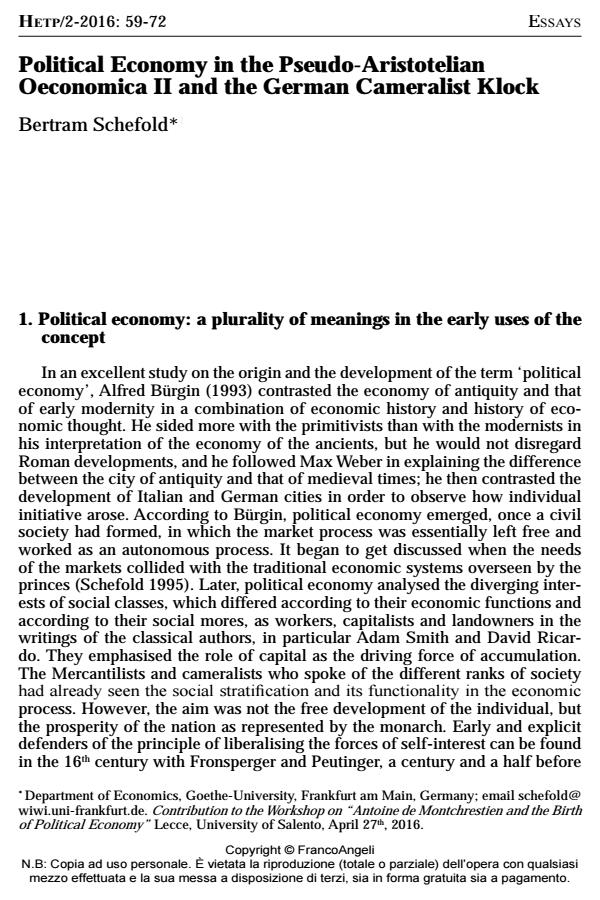Political Economy in the Pseudo-Aristotelian Oeconomica II and the German Cameralist Klock
Titolo Rivista HISTORY OF ECONOMIC THOUGHT AND POLICY
Autori/Curatori Bertram Schefold
Anno di pubblicazione 2016 Fascicolo 2016/2
Lingua Inglese Numero pagine 14 P. 59-72 Dimensione file 195 KB
DOI 10.3280/SPE2016-002004
Il DOI è il codice a barre della proprietà intellettuale: per saperne di più
clicca qui
Qui sotto puoi vedere in anteprima la prima pagina di questo articolo.
Se questo articolo ti interessa, lo puoi acquistare (e scaricare in formato pdf) seguendo le facili indicazioni per acquistare il download credit. Acquista Download Credits per scaricare questo Articolo in formato PDF

FrancoAngeli è membro della Publishers International Linking Association, Inc (PILA), associazione indipendente e non profit per facilitare (attraverso i servizi tecnologici implementati da CrossRef.org) l’accesso degli studiosi ai contenuti digitali nelle pubblicazioni professionali e scientifiche.
Montchrétien was decidedly mercantilist. He praises the ancients, their honour and their self-discipline, but he notes, like Serra, that there was no concept of Political Economy in Antiquity. The words, however, appear for the first time in the pseudoaristotelian Oeconomica II, where the householding by a king, the householding of the governor of a province, the administration of a city (polis) and the household of a private citizen are distinguished; the term applies to the financing of a city economy. The book contains a multitude of prescriptions of how to finance a city by means of varying forms of taxation, gifts, forced loans and by means of manipulating the currency. Especially the latter schemes are of extreme interest for the historian of economic thought, as they reveal a remarkable understanding of metallist and nominalist conception of money. The paper tries to explain the contexts and then goes on to compare these doctrines with cameralism, using the comments published in 1651 by the German cameralist Klock on Oeconomica II. He treats the proposals as if they were made by contemporaries, assessing them from practical and moral points of view in a way that suggests a parallelism of institutions and ideas.
Parole chiave:Mercantilism, cameralism, economics of Antiquity, public finance
Jel codes:B11, E62, E65, H20, H74
- Ancient Economies in Comparative Perspective Bertram Schefold, pp.25 (ISBN:978-3-031-08762-2)
- Paternalism and the Public Household. On the Domestic Origins of Public Economics Maxime Desmarais-Tremblay, in SSRN Electronic Journal /2017
DOI: 10.2139/ssrn.2995447 - Paternalism and the Public Household Maxime Desmarais-Tremblay, in History of Political Economy /2021 pp.179
DOI: 10.1215/00182702-8905977 - Political economy revisited: structures and objectives at the systemic level Ivano Cardinale, Roberto Scazzieri, in Economia Politica /2024 pp.153
DOI: 10.1007/s40888-024-00331-4
Bertram Schefold, Political Economy in the Pseudo-Aristotelian Oeconomica II and the German Cameralist Klock in "HISTORY OF ECONOMIC THOUGHT AND POLICY" 2/2016, pp 59-72, DOI: 10.3280/SPE2016-002004